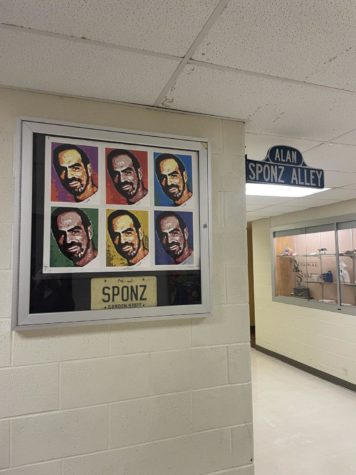A war on the War on Drugs
November 15, 2019
Illegal drug use, a widely contested problem that supersedes political party lines. One that has no clear solution from either side but desperately needs one.
Right now, people are shamed and even imprisoned for using drugs.
Our cultural and legal approach to drug abuse only furthers the issue.
According to North Jersey.com, in 2016, Bergen County recorded 308 different drug overdose incidences, which suggests a clear upward trend of heroin and opioid use in Bergen County. Further, according to Patch, There were 21 substance abuse cases reported in Glen Rock during the 2017-18 school year.
Illegal Drug use increased from the 2016-2017 year when there were 14 cases. In our town, drug use is increasing in part due to a stigma on drug use.
In our high school, when students are caught with drugs, they are suspended and treated as outcasts. This stigma can be compared to our society’s take on illegal drug use.
The current “War on Drugs” does not mitigate the (approximately) 10 percent of students misusing all types of amphetamines, or the 16 percent of high school seniors using marijuana in the past month, according to The Recovery Village, which provides information, rehabilitation centers, and hotlines for those struggling with drug abuse.
Boston University found that people convicted on federal charges of possessing any controlled substance can face up to one year in prison, and a fine of $1,000 up to $100,000. This essentially means that if a person is convicted of possession of illegal drugs, they could experience jail time and thousands of dollars of fines.
These fines often go to the thousands, and even tens of thousands of dollars, taking a huge portion of addict’s yearly income. The US average household income is $56,516 (CNBC). Fines and jail time could put people into poverty, while simultaneously cutting their chances of getting a job in half.
Harvard Professor of sociology Devah Pager found that men who had criminal records were about 50 percent less likely to receive a job offer or callback. Employers often don’t want to hire criminals. Not only are they fined, but they also struggle to find jobs.
It is often believed that the best way to stop people from using harmful drugs is to have severe consequences for being caught. However, this issue isn’t that simple. To understand how to slow the use of drugs, it is imperative to understand the true reason that people use drugs in the first place.
Psychology Today finds that “the person escaping life uses substances more regularly, more heavily, and is trying to escape what he finds to be a mundane or painful existence.” Essentially, people who are not happy with their lives in the first place take drugs to escape. This escape ends up not being enough due to a build-up intolerance, and eventually, people spiral out of control.
If people are jailed or fined massive amounts for using an escape to their lives, their lives could worsen. This leads to addicts needing more of an escape to a worse life. In this case, addicts have no chance to escape the use of drugs and have no happier life to stop escaping.
If the judicial system’s goal is to stop people from ruining their lives with drugs, promoting the use of them is counterproductive.
This is especially true considering the sheer number of people jailed for drug offenses.
The Federal Bureau of Prisons finds that nationally, 45.2 percent of all inmates are in prison because of drug offenses. Further, the US National Library of Medicine and National Institutes of Health explain that former inmates have an extremely high risk of relapsing and even overdosing after being released. Additionally, drug addicts experience high rates of recidivism. Specifically, according to Pew Trusts and the Bureau of Justice Statistics, the national re-arrest rate of drug offenders is 77 percent within just five years after release. This is commonly due to their living conditions afterward and inadequate economic resources.
Punishing someone, therefore making their lives worse, will not make their lives easier to return to. This will not reduce an addict’s addiction.
Proponents of criminalization may ask how it is possible to reduce the use of drugs. Decriminalizing the use of drugs but continuing the criminalization of drug dealing could provide a solution or at least mitigation for these issues.
If people aren’t jailed for using drugs but instead are encouraged to attend 12-step programs and rehabilitation centers, addicts’ lives could improve instead of worsening. If addicts then aren’t perceived as criminals but people who need help, societal pressures could also lessen.
This is easily fundable as, on average, every inmate costs the federal or state level governments $99.45 per day, or an average of $36,299.25 yearly, according to the Federal Register. If 45.2 percent of prisoners are exonerated and more aren’t convicted for drug use, millions of dollars would be saved. This saved money could be spent on rehabilitation for addicts and further funding for prosecuting drug dealers.
Criminalization of illegal drugs isn’t just harmful to our society, but decriminalization benefits public safety.
Drug Policy explained that after decades of empirical evidence from around the world showed that reducing or eliminated criminal penalties does not increase drug use or crime, rather it drastically reduces addictions, overdoses, and even HIV/AIDS transmission.
Looking overseas, Portugal enacted one of the most extensive drug reforms in 2001. It decriminalized low-level possession and any use of illegal drugs. Today, no one is arrested for drug possession, and many more receive treatment. Addiction, overdose, and HIV/AIDS occurrences have drastically decreased, according to Drug Policy.
Decriminalization has become a popular idea in our own borders. 64 percent of Maine presidential primary voters supported ending arrests for drug use and possession. New Hampshire followed with 66 percent, and even 59 percent of South Carolinian voters agreed. In 2016 and 2017, the first state-level decriminalization bills have been introduced. Hawaii legislature approved a bill that created a commission to study decriminalization.
In New Jersey, Governor Murphy and Senate President Sweeney are pushing to pass a bill that legalizes marijuana this year, according to app. from USA Today.
When people take drugs to escape their lives, they should be given a better life to live instead of a worse one to continue escaping. The obvious societal benefits and popularity of decriminalization should not be ignored. Decriminalization of illegal drugs is the best way to stop drug use.
(This article was revised to include a paragraph about the benefits of decriminalization of illegal drugs.)





